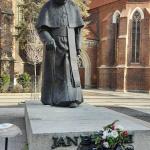
A voice is heard in Ramah, mourning and great weeping, Rachel weeping for her children and refusing to be comforted, because they are no more.
She carried Him into Egypt and raised Him in hiding from Rome, but eventually, Rome won.
Rome always wins.
Run, and Rome runs faster than you ever could.
Hide, and Rome finds you.
Fight, and you die by the sword.
Preach to the people the love and mercy of God, and they will turn you over to Rome to be crucified.
Rome always wins.
Miriam holds her Son to her immaculate heart one last time.
This time, His heart does not beat.
He is cold. His body reeks of sweat and dried blood. His face is discolored and swollen almost beyond recognition– by looks alone, she could almost not recognize Him. But a mother’s heart cries out to the flesh of her flesh. She knows Him.
He is dead, now. He has gone where she cannot follow. She cannot comfort Him. There is no reason to remain strong any longer. She lets her tears flow. She cries. She wails. She rocks Him. She kisses His bruised face.
Is this nothing to you, all you who pass by? Look and see! Is there any pain like mine, which was dealt out to me, which the Lord made me suffer on the day of his burning anger?
Why would anyone look and see? Miriam was never anything to look at. She was a poor girl from a hated race who spent her life in hiding, saying next to nothing. Now she is that most common eyesore, the grieving mother of one of Rome’s victims. Rome chose Golgatha as their place for public executions. Scenes as bad as this and worse happen every day, here. There is nothing to see. There is nothing to notice. Rome always wins, and this is what happens to the ones that lose.
Miriam knows this. She cries even harder. Her sobs shake her body until she looks like her Son did, struggling for breath on the cross. John the Beloved and Mary Magdalene are afraid she’s going to die right there. They can’t fully understand that she has already died. He was her whole life, and He is gone.
He did say that He would return, of course. Miriam heard Him, and she believed Him. She believed His every word. She, His perfect Disciple, trusted, though she couldn’t always understand.
“The Son of Man is going to be betrayed into the hands of men,” He said. She believed Him, and it happened. “They will kill him,” He said. She believed Him, though it terrified her. And here, it’s happened. “After three days he will rise.” She believed Him. But it has yet to come true.
What does it mean?
Is He going to wake up, like the Official’s Daughter or the Widow’s Son?
Is He going to come stumbling out of the tomb like Lazarus?
If He returns from the dead, then Rome doesn’t win.
But Rome always wins.
It takes faith beyond any faith she has had so far, to believe that Rome is still going to lose– that her Son is going to come back to her. This seems so much more outlandish than a virgin becoming with child by a fiat whispered to an angel. She was a young woman, then; now she is old, a widow, and the mother of a dead Son. That her Son could return, that Rome could lose, that this impossible grief could be lifted from her broken heart, that His heart could beat again: that is the hardest thing she has ever had to believe.
Miriam is the perfect disciple.
She believes.
She cannot feel that it is true. She feels nothing but grief and trauma that wash over her again and again in ice-cold waves. But she wills to believe that what Jesus said is true. She makes the act of faith in the absence of any consolation. She hopes against hope. Rome has not won. She will see her Son once more.
Then exhaustion overwhelms her.
(image via Wikimedia Commons)
Steel Magnificat will be meditating on the Sorrows and Joys of Mary throughout Saint Philip’s Fast. Previous entries can be found here:
The First Joy The First Sorrow
The Second Joy The Second Sorrow
The Third Joy The Third Sorrow
The Fourth Joy The Fourth Sorrow
The Fifth Joy The Fifth Sorrow

















